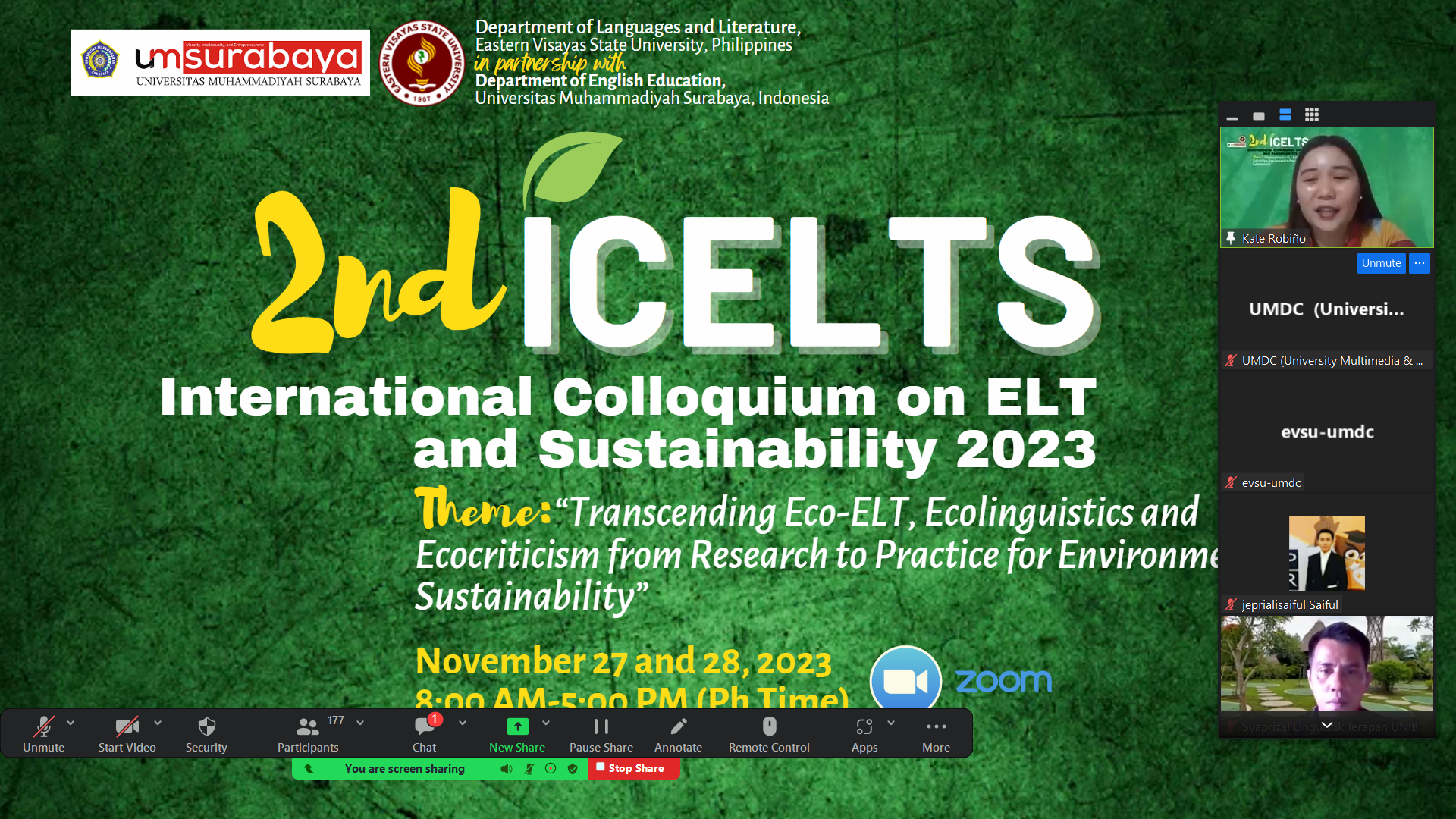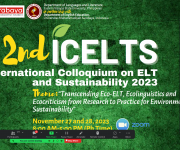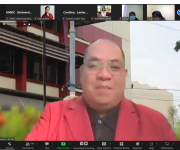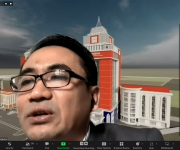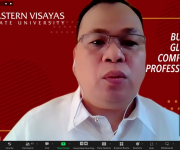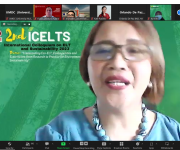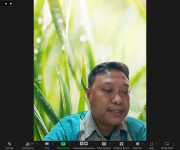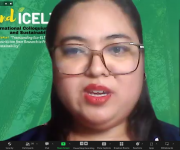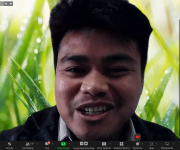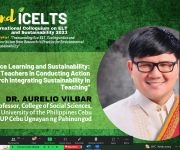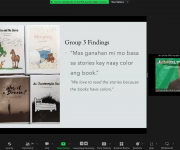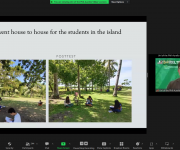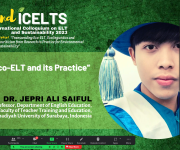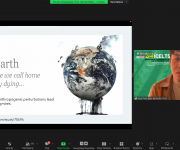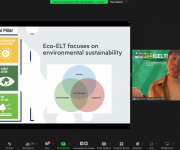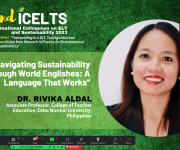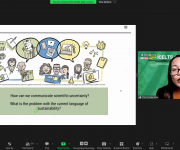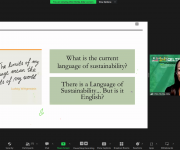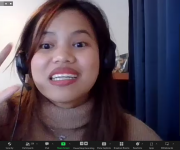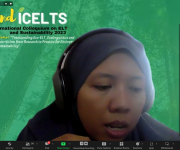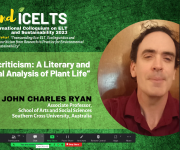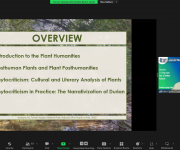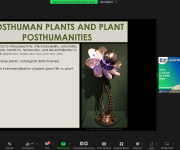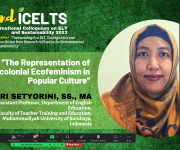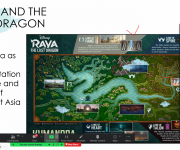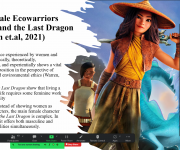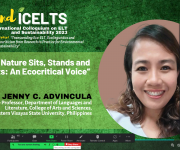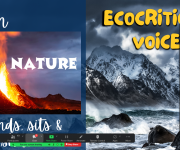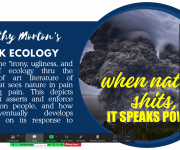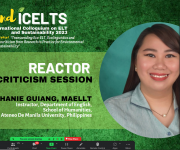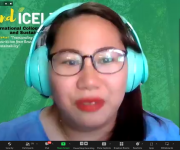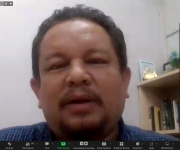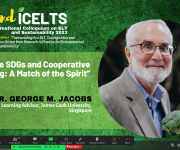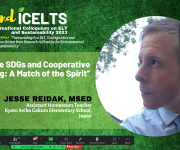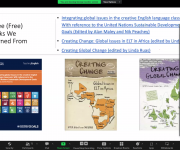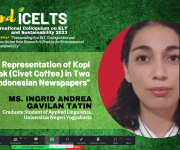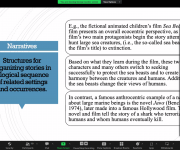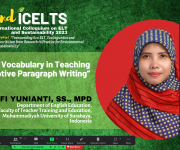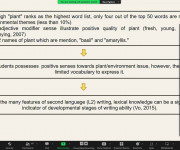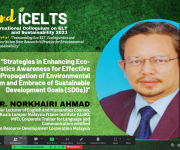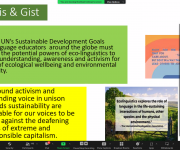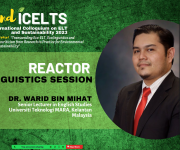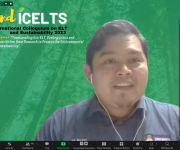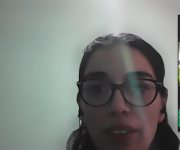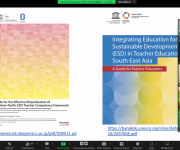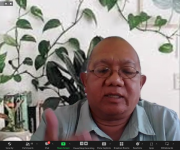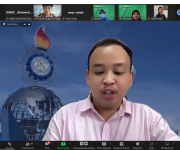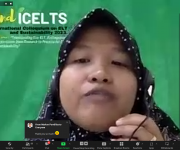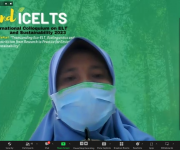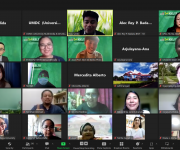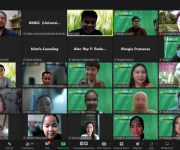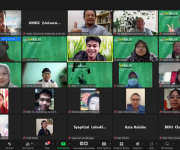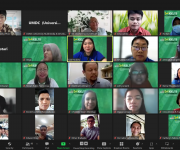The Department of Languages and Literature (DLL) of Eastern Visayas State University (EVSU), in partnership with the Department of English Education (DEE) of Universitas Muhammadiyah Surabaya (UMS), Indonesia, successfully orchestrated the 2nd International Colloquium on English Language Teaching and Sustainability (ICELTS) with the theme “Transcending Eco-ELT, Ecolinguistics, and Ecocriticism from Research to Practice for Environmental Sustainability” on Nov 27-28, 2023, via Zoom.
The colloquium is an annual gathering of academic staff, scholars, researchers, and students from different parts of the world who joined the event to gain insights into the dynamic convergence of ELT and Sustainability. The event was joined by an impressive turnout of almost 300 participants from various academic institutions in the country and abroad.
In his welcome message, EVSU President, Dr. Dennis C. de Paz, applauded the initiative of the department in making internationalization linkages a reality. “We move forward with our journey that has the potential to create a more sustainable and linked world as we get together to examine the relationship between ELT and sustainability,” he stated. Meanwhile, the Vice-Rector for Internationalization and Digitalization Affairs of UMS, Dr. Mundakir, delivered his inspirational message to participants and researchers in the virtual space. “The second ICELTS 2023, in collaboration between the Department of Languages and Literature of CAS and Department of English Language Education program of Surabaya is a crucial academic discussion forum. This colloquium is relevant to global climate change as one of the most significant challenges to human development,” he detailed.
Amplifying the edifice of university’s visibility in the global arena, Vice President for Internationalization and External Affairs, Dr. Danilo B. Pulma, commended the department’s initiative to establish partnership to universities abroad. “This colloquium aligns seamlessly with the international program of EVSU- the commitment to fostering collaboration and engagement with international partners such as Surabaya,” the VP explained.
Advocate of English Language Teaching as one of her fields of expertise, the Dean of the College of Arts and Sciences, Dr. Glenda B. Tupaz, shared a special message as regards the relevance of ecolingustics and environmental safeguarding. “We are hopeful that this platform can create more collaboration as we venture into leveraging ecological linguistics as pivotal in creating a healthy environment, Dr. Tupaz highlights in her special message.
Ms. Harriette Mae A. Mercullo, the Head of DLL, unveiled the theme’s rationale for this year’s colloquium. “Converging ELT and environmental sustainability is timely and relevant as we battle with a myriad of ecological and environmental challenges,” Ms. Mercullo said. In this way, ELT teachers and scholars will be given opportunities for the development of necessary knowledge, skills, and attitudes that could help deepen learners’ connections with English as a tool for sustainability. “As vanguards of environmental conservation and scholarly truth, the conduct of research in the field of eco-ELT, ecolinguistics, and ecocriticism and the ability to translate significant research findings into practice along these areas of inquiry is essential towards achieving environmental sustainability,” she furthered.
The two- day colloquium was divided into three categories, to wit: Eco- ELT, Ecocriticism and Ecolinguistics sessions, inviting brilliant speakers from all over the world. The Eco-ELT session emboldens its concept through scholarly presentations of diverse topics by the speakers, Dr. Aurelio Vilbar, on his service learning and sustainability discussion; Dr. Jepri Ali Saiful, on Eco-ELT and its practices; and Dr. Rivika Alda, navigating sustainability through World Englishes.
Moreover, creating a stark nexus between literature and nature, ecocriticism session highlighted the discussion of Dr. John Charles Ryan through his Phytocriticism topic, Prof. Ari Setyorini on her representation of postcolonial ecofeminism in popular culture, and Dr. Ma. Jenny Advincula on her talk that delved on ecocritical voice, dark ecology and ecological consciousness. In the interim, the topic centering on Sustainable Development Goals (SDGs) on ecolinguistics session was given fairness through the comprehensive discussion of Dr. George Jacobs and Prof. Jesse Reidak. Further, another talk of Dr. Jacobs with Dr. Chau Meng Huat and Prof. Ingrid Tatin on the representation of Kupi Luwak in two Indonesian newspapers sparked greater interest from the participants. Meanwhile, Prof Sofi Yunianti centered her discussion on Eco vocabulary in teaching descriptive paragraph writing, while Dr. Norkhairi Ahmad zeroed in his topic on strategies in enhancing ecolinguistics awareness.
The dynamic exchange of ideas from highly competent speakers had left participants with so much to process and contemplate during the two-day colloquium. The different sessions were engrossed with reflective and critical insights by the three panel reactors: Ms. Mira Villapaňa of the Department of English, FPT University-Quy Nhon AI Campus, Binh Dinh, Vietnam; Ms. Stephanie Guiang of the Department of English, Ateneo de Manila University; and Dr. Warid Bin Mihat of the Department of English, Universiti Teknologi Mara, Kelantan, Malaysia.
In her closing message, Prof. Ro’Ifah, Head of the Department of English Education of UMS, Indonesia, extended her gratitude for the strong partnership that emerged between the two universities, paving the way for orchestrating colloquium, hence ICELTS 2023. “This colloquium is an implementation of collaboration between Department of Languages and Literature and English education Department, Faculty of Teacher Training and education, and then the theme Transcending Eco-ELT, Ecolinguistics, and Ecocriticism from Research to Practice for Sustainability. This aims to develop knowledge and competency of human resources in preserving nature,” she stated. The joint conduct of the said colloquium was an offshoot activity of the recently signed Memorandum of Understanding (MoU) and Memorandum of Agreement (MoU) between EVSU DLL and UMS DEE.
Enlivening the legacy of enhancing linguistic constructs and developing ecological awareness, the sessions served as repository of knowledge, wellspring of ideas, and avenue to strengthen research climate in the world of symbiotic importance.




